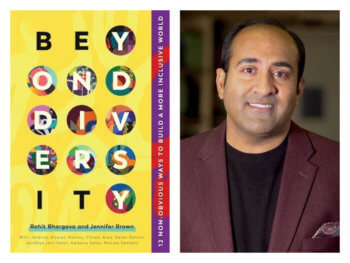
How South Asian Businesses In North America Are Adopting Sustainable & Eco-Friendly Practices (And You Can Too!)
Business Aug 26, 2024
In recent years, sustainability and ethical business practices have taken center stage across various industries, particularly in textiles, food production, and beauty. Consumers today are more informed and concerned about their purchases’ environmental and social impact, driving businesses to adopt greener, more ethical practices. South Asian-owned companies in North America are at the forefront of this movement, leading the charge with innovative approaches that resonate with eco-conscious consumers and contribute significantly to the overarching goal of saving the environment, instilling hope and optimism for a greener future.
The Global Shift Towards Sustainability
The global push towards sustainability has grown steadily, with consumers demanding more transparency and responsibility from businesses. This shift is particularly evident in industries like textiles, food production, and beauty, where the environmental impact is significant. These industries are major contributors to environmental degradation, from the extensive use of natural resources to the generation of waste and pollution.
Businesses worldwide are reevaluating their practices to reduce waste, minimize carbon footprints, and ensure ethical sourcing. This shift is not just about meeting consumer demand; it’s about recognizing the urgent need to protect our planet for future generations. It’s a testament to the power of consumer choices in shaping business practices, empowering consumers to make a positive impact through their purchasing decisions.
The Role of South Asian-Owned Businesses
South Asian-owned businesses in North America increasingly embrace sustainability as a core part of their operations. These businesses lead by example, driven by consumer demand and a deep-rooted cultural ethos of respecting nature and community. Their innovative approaches demonstrate that profitability and sustainability can go hand in hand and inspire others to follow suit.
1. Textiles: From Fast Fashion to Conscious Choices
The textile industry has long caused environmental harm by using excessive production of water and generating pollution through synthetic dyes. However, many South Asian-owned textile businesses are pioneering a shift towards more sustainable practices. By focusing on organic, eco-friendly materials and traditional production methods, they reduce their environmental impact while preserving cultural heritage. Brands can use more sustainable materials and practices, implement a circular fashion mindset, use more transparent methods for sourcing material, and educate consumers and bring awareness on eco-friendly practices.
For instance, some businesses are reviving the use of natural dyes and handloom weaving, practices that are less harmful to the environment, and support local artisans and communities. These efforts appeal to North American consumers, who are increasingly seeking products that align with their values.
Examples:
- Dahlia Boutique (Canada): Specializes in eco-friendly clothing made from organic and natural fibers, emphasizing slow fashion and ethically sourced materials.
- Karigar (Canada): Promotes traditional craftsmanship by working directly with South Asian artisans, ensuring fair wages and sustainable production processes using natural dyes and materials.
- The Ethnic Counter (Canada) offers eco-conscious clothing and accessories crafted using upcycled and natural materials. It works closely with Indian artisans to preserve traditional techniques while promoting sustainable fashion.

2. Food Production: Ethical and Sustainable Choices
South Asian-owned businesses are making significant strides in promoting ethical and sustainable practices in the food industry. From sourcing organic ingredients to adopting fair trade practices, these businesses ensure their products benefit consumers and the planet.
One example is the rise of South Asian-owned organic food brands prioritizing sustainable farming practices. These brands work directly with farmers to ensure their methods are environmentally friendly, focusing on reducing pesticide use, conserving water, and protecting biodiversity. This approach not only produces healthier food but also offers a hopeful vision for the future of food production.
Examples:
- Diaspora Co. (USA): This company sources single-origin spices from India. It focuses on regenerative agriculture and fair trade and pays farmers significantly higher than commodity prices.
- Patel Brothers (USA): While known as a grocery chain, Patel Brothers increasingly focuses on sourcing organic and sustainably produced goods, supporting small farmers, and offering environmentally friendly products.
3. Beauty: Green is the New Glam
The beauty industry has also seen a surge in demand for sustainable and ethical products, with consumers becoming more aware of their product’s environmental impact. South Asian-owned beauty brands are responding to this demand by creating products free from harmful chemicals, cruelty-free, and packaged in eco-friendly materials.
These brands often draw inspiration from traditional South Asian beauty practices, which have long relied on natural ingredients. Combining ancient wisdom with modern sustainability offers consumers effective products that align with their desire to make environmentally conscious choices.
Examples:
- Fable & Mane (USA): A haircare brand inspired by Ayurvedic rituals, committed to using natural, cruelty-free ingredients with eco-friendly packaging.
- Sahajan (Canada): A skincare brand featuring Ayurveda based beauty products with natural, cruelty free and eco-friendly practices.
The Road Ahead
As the focus on sustainability and ethical practices continues to grow, South Asian-owned businesses in North America are well-positioned to lead the way. By embracing sustainable practices, they are meeting the needs of today’s environmentally conscious consumers and contributing to the global effort to save the environment.
The rise of these businesses reflects a broader shift towards a more sustainable and ethical future, where companies recognize their responsibility to protect the planet and its people. As more consumers actively seek products that align with their values, the demand for sustainable and ethical practices will only grow, driving more businesses to follow suit. This consumer-driven change empowers individuals to make a positive impact through their purchasing decisions.
In conclusion, South Asian-owned businesses in North America are not merely adopting sustainable practices as a trend; they are embedding them into their core values to impact the environment positively. This commitment to sustainability is not only good for business but also essential for the future of our planet.
Feature Images: Unsplash.com
Author
Internationally celebrated, award-winning media personality and author of several business and lifestyle articles, Tushar Unadkat, is the CEO, Creative Director of MUKTA Advertising, Founder, and Executive Director of Nouveau iDEA, Canada. He holds a Master of Design from the University of Dundee, S...













































































































